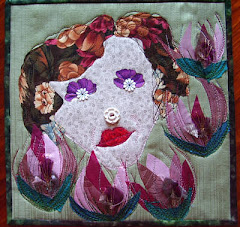



So, where to store all those bits and pieces that I just can't bear to throw away?
I mean those shells with interesting patterns; tiny pieces of driftwood with an interesting shape and lines of texture; a tiny bright coloured bow that once topped a gift; a Buddhist prayer bead bracelet given to me in Kyoto; a dragonfly that was made from green, pliable leaves and has now totally dried out but is so cleverly made that I have to keep it so that I can continue to admire it; seed pods collected on walks; tiny offcuts of painted and stitched textiles; the top of a miniature teapot that belonged to my grandmother - all that was left after it was knocked to the floor; a gold paper doily that my mother-in-law once made into a little basket to hang on the Christmas tree; brightly coloured feathers from the local parrots;... and butterfly wings.
Well, I decided that it was silly to have them cluttering up boxes in my studio, so I put them in a typesetter's drawer, and sat it in the middle of the dining table. It's easy to move when there's more than two of us for a meal, and it often provides me with inspiration. Guests wandering by the table love to inspect the contents, too.
Of course, it gets dusty, and the dust storms that we've had in the last few weeks added quite a bit to the layer already there. So, I emptied it, dusted everything, and changed some of the contents around. This time, each row has a colour theme.
